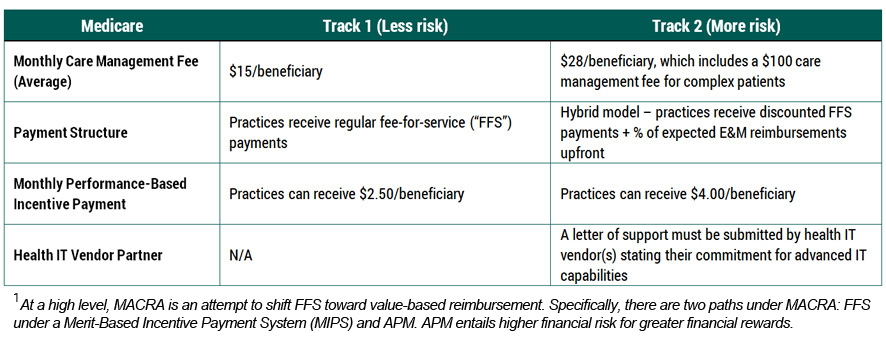In a recent article, Jen Johnson, CFA and Mary Fan, CVA of VMG Health review the unveiling of the Comprehensive Primary Care Plus (CPC+) initiative.
In April of 2016, the Center for Medicare and Medicaid Services (CMS) unveiled the Comprehensive Primary Care Plus (CPC+) initiative. It's the largest investment in primary care transformation to date as part of the shift towards value-based reimbursement (VBR). This reform program is an extension of the Comprehensive Primary Care (CPC) initiative that launched four years ago and is set to end December of this year. As of October 2015, over 400 primary care practices were participating in CPC encompassing eight states: Arkansas, Colorado, New Jersey, New York, Ohio, Kentucky, Oklahoma and Oregon. As new payment models evolve, appropriately determining fair market value (FMV) for physician compensation will remain a challenge for healthcare executives.
At face value, the CPC+ initiative is meant to accommodate practices at different levels of readiness for this transformation. Track 1 is targeted towards practices seeking to start providing comprehensive care, whereas Track 2 is a hybrid model that focuses on care provision and prevention outside of the traditional face-to-face encounter, including telemedicine visits or longer visits for patients with complex needs. The overall focus on better established relationships (payor and payor, doctor and patient) will help strengthen the quality and efficiency of care.
CPC+ is expected to involve up to 5,000 practices and 20,000 physicians in 20 regions (amounting to over 25 million patients) throughout its five-year plan starting January 2017. Providers can participate in CPC+ under two tracks, which will both provide a monthly care management fee and upfront performance-based incentive payments (latter of which is subject to return at year end if certain quality and utilization standards are not met). Although not confirmed at this time, CPC+ may be considered an alternative payment model (APM) under the Medicare Access and CHIP Authorization Act of 2015 (MACRA). Please refer to the chart below detailing the key differences between the two tracks:

Click here to continue reading the article in full>>

